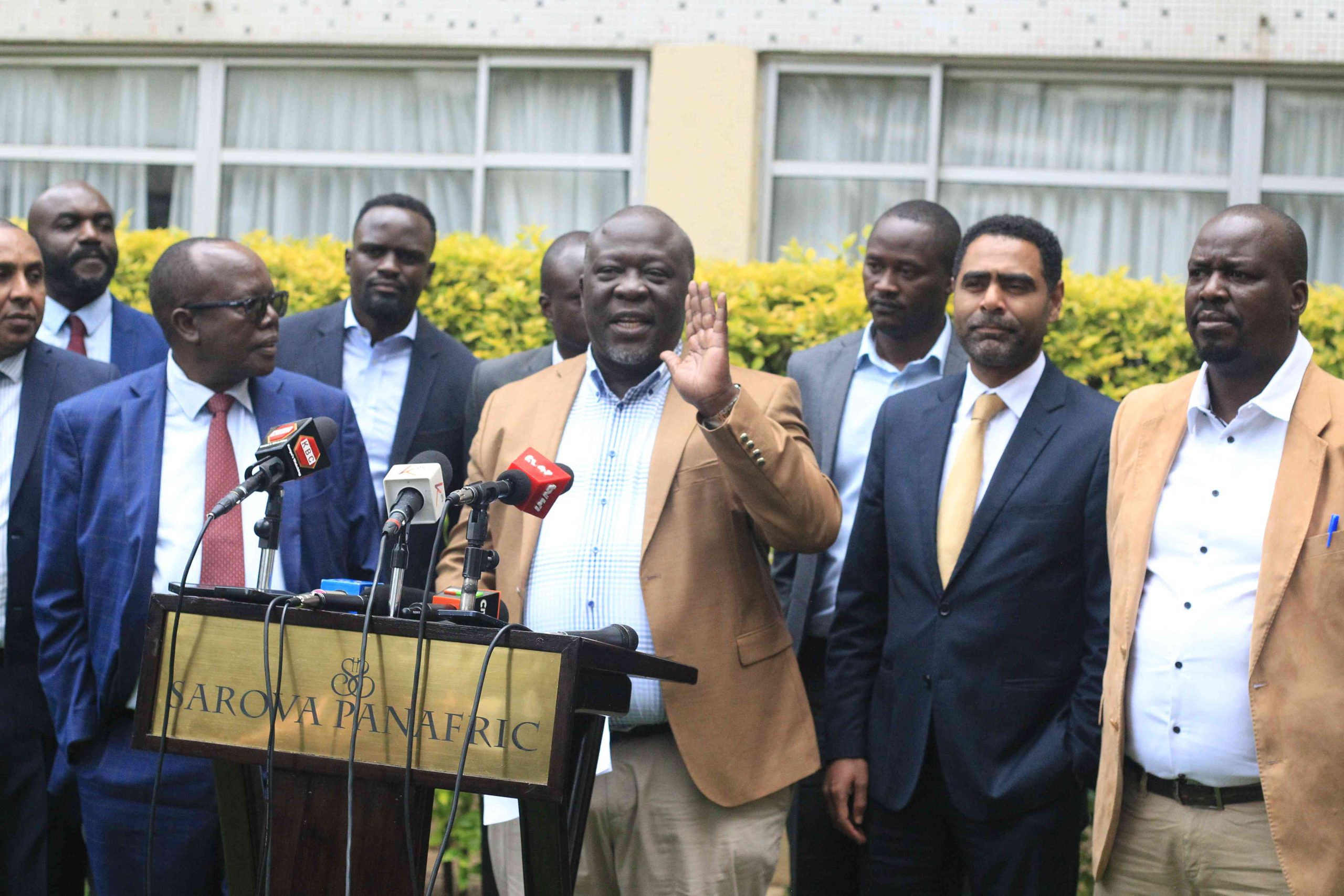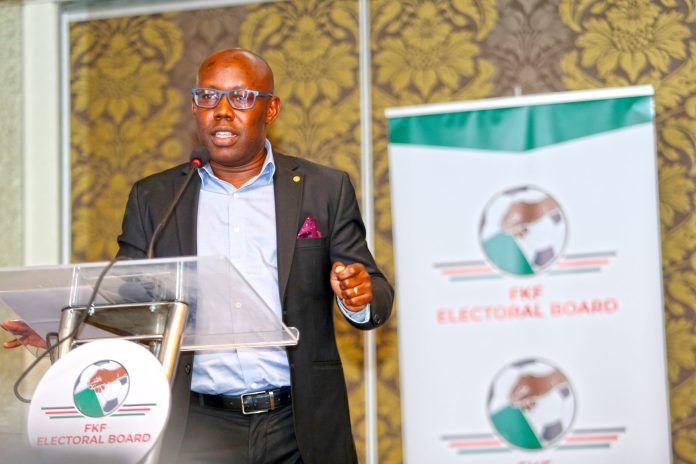The Football Kenya Federation (FKF) branch elections will be held this Thursday across 44 counties, marking a critical phase in the election process leading up to the national FKF presidential race. With eight presidential candidates vying for support in these regional elections, the stakes are high as each candidate campaigns vigorously to secure key votes from county delegates, who will play a decisive role in the national elections scheduled for December 7.
This significant election comes on the heels of a Kitui High Court ruling earlier this week that lifted an injunction which had temporarily halted the election process. Justice Robert Limo dismissed the petition seeking to disband FKF and recognize the Kenya Football Association (KFA) as the election body, citing procedural issues by the petitioner and the existence of a similar case filed in Milimani court. With the green light from the court, FKF’s branch elections are now set to proceed.
Eight Candidates Compete for FKF’s Top Leadership
Eight candidates are campaigning to become the next president of the FKF: Doris Petra, Barry Otieno, Hussein Mohamed, Tom Alila, Chris Amimo, Cleopha Shimanyula, Sammy Owino, and Sam Ochola. Each brings a unique platform, with promises of structural reform, grassroots investment, and a commitment to elevate Kenyan football on both the national and international stage.
The candidate pool reflects a diverse range of backgrounds, including current FKF officials, former players, and business executives. Doris Petra, the FKF’s current deputy president, is one of the few female candidates and is seen as a strong contender. Her experience within the FKF provides her with institutional knowledge, which could be a significant advantage.

Barry Otieno, another notable candidate, is the current FKF CEO, whose leadership throughout his tenure has focused on modernizing Kenyan football administration. With a comprehensive understanding of FKF operations, Otieno appeals to those looking for continuity and stability. Hussein Mohamed, known for his extensive experience in football management, is also campaigning vigorously with a vision to revamp Kenyan football’s operational framework.
The Importance of County Elections: 44 Counties Voting
Branch elections across 44 counties are set to begin at 7 a.m., with county chairpersons, who will form part of the voting delegate pool, standing for election. These chairpersons, along with other regional representatives, will be among the 92 delegates eligible to vote in the national FKF elections in December. Their votes are crucial, as they represent half of the total voting power in the upcoming national elections, meaning the county results on Thursday will shape the presidential election’s dynamics.
In four counties—Baringo, Tharaka Nithi, Makueni, and Kirinyaga—no elections will take place, as candidates for all elective positions in these regions are unopposed. This scenario simplifies the election process for these counties but intensifies competition in other areas, especially in regions where candidates are campaigning actively to secure every possible vote.
Key Battlegrounds: Nairobi, Coast, Nyanza, Central, and Rift Valley
To maximize their chances in the December election, presidential candidates have concentrated their campaigns in vote-rich regions, including Nairobi, Coast, Nyanza, Central, and Rift Valley. These counties are seen as critical battlegrounds, with large numbers of delegates and an influential role in the final vote count. A win in these areas could provide a significant edge for any candidate heading into the December election.
Nairobi, as the capital, holds particular importance due to its diverse football community and significant delegate representation. A candidate with strong backing from Nairobi has a notable advantage, given the region’s influence in shaping public opinion and rallying national support. Coast, a region with a rich footballing history, and Rift Valley, known for its passionate fan base, are also strategic focuses for candidates hoping to secure regional loyalty.
The Stakes: FIFA’s Watchful Eye and Kenya’s Football Future
The FKF elections come amid concerns over potential FIFA sanctions, as delays or disruptions in the election process could lead to Kenya being banned from international competitions. Such a scenario would be devastating for Kenyan football, impacting clubs, players, and the country’s reputation on the global stage. FKF’s legal team highlighted this risk during the recent court hearings, emphasizing that any further postponement would harm the sport’s progress in Kenya.
FIFA’s involvement underscores the importance of transparency and proper procedure in the FKF elections. To avoid sanctions, the FKF must adhere to the election schedule and ensure a fair, free, and credible process that aligns with FIFA’s governance standards. Consequently, candidates are not only campaigning for delegate votes but are also mindful of the broader implications of their actions on Kenya’s football landscape.
Presidential Candidates’ Vision: A Glimpse of Potential FKF Leadership
Each presidential candidate has outlined a vision for the future of Kenyan football. Key areas of focus include strengthening grassroots programs, improving transparency within FKF operations, and ensuring that Kenya competes more effectively in international competitions. The challenge is to balance these ambitions with realistic, achievable goals that address the immediate needs of players, fans, and stakeholders.
Doris Petra, for instance, has emphasized gender inclusion and developing youth programs to widen the talent pipeline. Barry Otieno’s campaign centers on digital transformation and improving governance standards, building on his experience as FKF CEO. Meanwhile, Hussein Mohamed advocates for a balanced approach that supports both grassroots development and professional football, emphasizing Kenya’s potential to compete on the international stage.
These election promises have resonated with county representatives, who see the FKF’s top position as a pivotal role in fostering a stable, competitive, and prosperous football ecosystem in Kenya. The FKF’s future president will need to bridge the gap between Kenya’s grassroots and elite football, enhancing infrastructure, training, and funding to create sustainable growth across all levels.
Thursday’s Election Process: Logistics and Anticipated Outcomes
Starting from 7 a.m., elections will be conducted in designated polling stations across the 44 participating counties. The process will involve the selection of county chairpersons, who will represent their counties in the national FKF presidential election. With such high stakes, the FKF has implemented measures to ensure smooth, fair, and transparent voting, working closely with county officials to uphold integrity in the election process.
Observers and representatives from various football stakeholders, including the Ministry of Sports, are expected to monitor the election to maintain transparency. Once Thursday’s results are announced, they will provide a clearer picture of each presidential candidate’s standing and the likely voting trends for December’s election. With half of the voting power determined by county delegates, candidates are particularly focused on Thursday’s outcomes, as any momentum gained here could propel them toward victory in the national election.
A Defining Moment for Kenyan Football
The FKF elections are set to reshape the future of Kenyan football at a critical juncture. As county representatives cast their votes, they will play a pivotal role in determining the FKF’s direction, leadership, and future vision. With candidates vying for support in key regions, Thursday’s elections are more than a regional exercise—they are a foundational step towards choosing a leader capable of driving growth, transparency, and success for Kenyan football on both national and international levels.
As Kenya prepares for the December national elections, the question remains: Which candidate will emerge as the trusted leader to navigate Kenyan football through challenges and towards a promising future? With FIFA’s attention on this pivotal election, all eyes will be on FKF to deliver a transparent and transformative process.
READ NEXT:
- Gor Mahia Chairman Ambrose Rachier Clarifies Decision Not to Pursue FKF Presidential Office
- Why Sports CS Murkomen Says Nick Mwendwa is Ineligible for FKF Vice Presidency in 2024 Elections
- Sydney Lokale’s Last-Minute Goal Saves AFC Leopards from Defeat Against Mara Sugar in Thrilling FKFPL Clash


